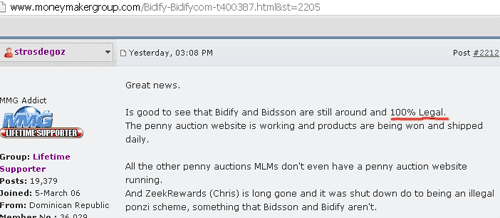Funky Shark fined $40,000 by Montana CSI

Following the SEC shutdown of the $600M Zeek Rewards MLM penny auction Ponzi scheme, we’ve seen a flurry of new MLM penny auctions launched – with most toting similarly dubious compensation plans to that which Zeek Rewards used.
For whatever reason, most of these penny auctions have announced or are in the process of going through extended prelaunch phases.
One possible reason is that, once the penny auction switch is flipped, MLM companies relying on them find themselves exposed to the tricky balancing game of relying on revenue from an unestablished penny auction and having to pay out their affiliates.
One way for a MLM company to tilt the odds of success in their favour is to go into prelaunch and charge affiliates money to join the company.
This way when the company launches they’ve got a “kitty” so to speak which they can then rely on to pay out affiliates, regardless of whether their penny auctions actually make money in those first few months.
One such MLM penny auction company that adopted this approach was the short-lived Funky Shark.
Funky Shark went into prelaunch in September 2012, asking “founder members” to cough up $1000, with the company guaranteeing a $500 commission for each founder member signed up.
As obvious a pyramid scheme as they come, not surprisingly after consulting with their legal counsel Funky Shark then announced that they’d abandoned their penny auction plans and would be issuing refunds to all investors.
At the time, it was revealed by Funky Shark that they did this over concerns about the feasibility of running an MLM penny auction that relied on retail profits to stay afloat.
What they didn’t tell anyone was that they were also facing court action filed by the Securities Commissioner of Montana.
In a press release put out yesterday, Monica Lindeen (Commissioner of Securities and Insurance for Montana) wrote
Bozeman resident Scott Wacker and his company, Funky Shark, (today were fined) $40,000 for illegally selling investment opportunities.”

Scott Wacker (photo right) had previously referred to himself as “Scott Walker” during Funky Shark’s prelaunch, why he did not use his actual name is not known.
On the thirty first of October, Funky Shark made the announcement they were abandoning their penny auction plans and would be issuing refunds to all their members.
On the same day Lindeen’s office filed for a temporary injunction against the company, with an order passed the following day (November 1st) restraining Scott and Jennifer Wacker (his wife?) from
- operating Funky Shark
- engaging in securities business practices in the state of Montana
- transferring or disposing of, or attempting to transfer or dispose of any monies or assets the Respondents possess or control that may have been obtained, in whole or in part, from investors or using investor funds
- transferring or disposing of, or attempting to transfer or dispose of any monies held in any of the bank accounts owned or controlled by any of the Respondents (Funky Shark, Scott and Jennifer Wacker)
Funky Shark’s lawyer, Kevin Thompson, advised that despite the close timing of Funky Shark shutting down and the issuing of a temporary injunction against the company, Funky Shark had pulled the plug prior to becoming aware of the order issued against them.
The press release from Monica Lindeen certainly seems to support this, with Lindeen noting that
Last September, Wacker began recruiting investors for his penny-auction website, FunkyShark.com. By the end of October, Wacker had raised over $1 million from investors across the world.
The flurry of transactions in Wacker’s personal and business accounts led his bank to file a suspicious activity report, which was referred to Lindeen’s office.
After reviewing the report, investigators suspected Funky Shark was a pyramid scheme and requested a restraining order to prevent additional investors from getting involved.
On Oct. 30, Wacker posted a notice on Funky Shark’s website explaining that its investment program “may violate certain securities laws in the United States.”
In the two months it operated, Funky Shark paid nearly $378,000 in commissions to participants who recruited new members.
Those commission payments left Funky Shark unable to repay all of its participants in full, so Wacker agreed to pay $270,000 out-of-pocket to make investors whole.
“Mr. Wacker stepped up to the plate and repaid his investors,” said Lindeen. “Often when we handle these types of cases, there’s simply no money left to repay participants.
But for a number of reasons, this case is unique. Mr. Wacker didn’t understand what he was getting into, and he has expressed his commitment to setting things right.”
When I first wrote about Funky Shark closing its doors I raised the question of how they were going to make up the shortfall of money owed to investors, given they’d already started paying out commissions. That’s also explained in the above excerpt, with the money seemingly coming out of Wacker’s own hip pocket.
Had Funky Shark’s legal counsel not advised them against launching a blatant pyramid scheme and had Wacker not had enough personal funds to cover the commissions already paid out in order to refund everyone who invested money in Funky Shark’s prelaunch, one can only wonder what might have occurred.
In the aftermath, I think it’s worth stating that Lindeen’s office took such a pro-active approach over Funky Shark.
If we use Zeek Rewards as an example, they operated for just over a year and a half before they were shut down (although how long the SEC were investigating Zeek Rewards has never been made public).
Here we had what was an obvious pyramid scheme model being used to raise funds for what was looking to be an equally questionable MLM penny auction business model, only to have investigators swoop down and take action before they had a chance to launch.
Again, had the authorities involved investigated Zeek Rewards earlier, one can only wonder whether the $600M Ponzi scheme mess currently playing out in courts across America might have been considerably mitigated.
In anycase, the actions and response time of Montana’s CSI office certainly makes for a refreshing change from the sluggishly reactive response authorities usually take against companies operating in the MLM industry with questionable business models.
In other MLM penny auction news, Bidify (Zeek Rewards’ #1 competitor at the time of their bust), recently announced that after changing their compensation plan to rely on retail bid sales, now had plans to shift back towards what suspiciously looks to be a largely affiliate-funded compensation plan.
After weeks of limbo following the announcement, Bidify pulled their website down around twenty four hours ago in order to implement the new business model and compensation plan.
Hailed as Bidify v2.0 by the company’s affiliates, they have been busy marketing the new compensation to attract new Bidify affiliates to the business, declaring the company’s proposed business model and compensation plan “100% legal”:

Bidify (at the time of publication, also represented by Kevin Thompson) are currently registered as an LLC in the US state of Delaware, however apart from a virtual mailbox address there, the company has no offices or employees working in the state. Most, if not all of Bidify’s management are based out of Europe.
It is also not known whether Bidify uses US-based banking channels or offshore accounts.


Not making excuses for KT, but I suspect he only reviewed the business model, not the startup fund-raising part (which was probably left out of any documents he was reviewing).
After all, you don’t really go to MLM lawyer for securities law, do you? 😀 But due to the amount of Ponzi-pyramid hybrids, perhaps they should (i.e. MLM lawfirms should hire a securities specialist to help their compliance department).
I do congratulate Wacker on his attempt to make things right… by paying out of his own pocket.
K. Chang,
I’m very familiar with Securities law. I think you missed this section from Funky Shark’s first announcement:
I was retained after they initiated the founder program.
My apologies in not making that clear. They started off on the wrong foot, and never regained their step, even with your help.